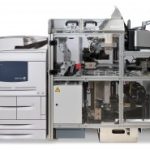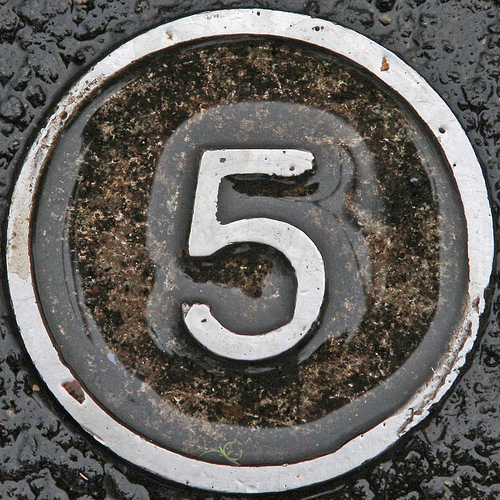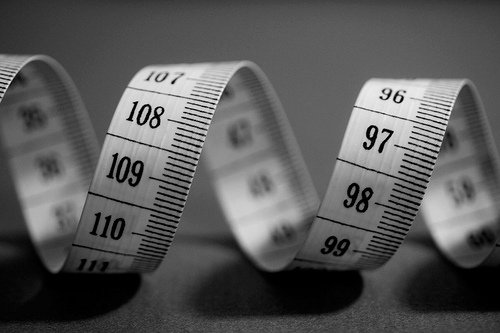Print on Demand–While You Wait, Here and Now
Imagine this future. You’ve ordered your double latte, and while you’re waiting for the barista to make your drink, you decide to buy a novel to read, since you have some time to kill this morning. You walk over to the simple, unassuming machine stationed in the corner of the coffee house and scroll through the titles, picking a novel you’ve been wanting to read (or maybe a classic you know is hard to find). You swipe your credit card and select one copy, and voila! Within minutes, and for about one cent a page, a book is printed–industry quality and with a beautiful four-color cover–which pops out into the tray for you to grab and dig into. By the time your name is called at the counter to fetch your drink, you have book in hand. Crazy concept? Well, that future is already here.
Welcome to the Espresso Book Machine manufactured and sold by On Demand Books. And before you think this is a joke or something silly, here is a list of some of the places that have one:
- The Library of Alexandria
- The Harvard Book Store
- Books Sanseido (Tokyo)
- Blackwell’s (Oxford)
- McNally Jackson (New York)
- The Brooklyn Public Library
Taking this a little more seriously? Think about it. If you don’t want to read on your e-reading device but you still want the fast deliverability with a print book, this is an ideal solution. So many are turning to reading eBooks because of their quick accessibility and convenience. But if your local coffee shop or library had the espresso book machine, and within minutes you could print out any book at all, would you use it?
Drawing Customers by the Droves
According to the March 24 blog post at Bookselling This Week In January, McNally Jackson, in New York City, added an Espresso Book Machine, whose print-on-demand option increased the store’s inventory by more than four million titles. In addition, it gives community members the opportunity to publish their own books at an affordable price. Owner Sarah McNally had nothing but positive things to say about the store’s newest feature. Word of mouth has been bringing customers in by the droves (is it the novelty or will this method of publishing become common everywhere–like vending machines?), and customers seem to be more interested in publishing their own books rather than printing from the store’s inventory, which, according to McNally, is indicative of an industry shift.
“People are really interested in self-publishing,” she said. “I’ve heard that this is what has been happening in other stores, and now I’ve seen it here, and it surprised me. I think that’s where the industry is going.” As the community becomes more familiar with the POD process, McNally believes demand will grow. The introduction of the machine led to some additional changes at McNally Jackson. “It requires a lot of staffing,” said McNally, adding that the store was understaffed at the time of the machine’s arrival. However, a full-time position has since been created for staff member Dustin Kurtz, who has been unofficially titled “Self Publishing Coordinator.” The store is getting ready to hire a second “book machine person” within the month.
Although there are many self-publishing avenues available online, McNally said, customers want to come to the bookstore to publish their book. “They want to be able to talk to a person about how to do it.” Thankfully, Kurtz is also a talented graphic designer, she said, so he is happy to assist customers with design. “He does it all,” McNally added. And if he can’t do it, the bookstore has someone else on staff that can, including several copyeditors.
So Many Benefits
According to LIS (library information services) Current Trends and Issues, “Being able to print in any language is a huge benefit to libraries or institutions that serve diverse, non-English speaking populations. Another perk associated with EBMs is the ability to self-publish. Anyone can publish their work quickly and cost effectively with these machines. While EBM benefits are many, there are also a few issues, cost being one. Several EBMs have been implemented in independent bookstores and academic libraries where funds may be less of an issue, but what about public libraries and other institutions with limited funding? In the case of Brooklyn Public Library, ‘the library and On Demand struck a deal in which the firm would install and operate the EBM at no cost to BPL, and charge patrons for printing out a book’ (Goldberg, 2012). So it seems there may in fact be hope for the budget conscious library.”
Clive Thompson on the Wired blog makes this observation: “Print-on-demand books can also become plastic—altered on the fly to suit each reader. For his self-published motivational book, Bobby Bakshi, a former Microsoft employee who  now does corporate consulting, writes a different intro for each client. Over at the University of Alberta, the bookstore hosted a talk by former Canadian prime minister Kim Campbell. Her book was out of print, so the store used its Espresso machine to run off fresh copies—with a new cover and two new chapters that Campbell wrote for the event. ‘We can take almost any whimsy and turn it into a book,’ says Vladimir Verano, who runs the Espresso machine at Third Place Books in Lake Forest Park, Washington. Whimsy, sure, but it’s also becoming an enormous market with an intergalactically long tail. Consider: In traditional print publishing, the number of new titles increased by 5 percent from 2009 to 2010, rising to 316,000. In contrast, print-on-demand and self-publishing boomed by 169 percent—hitting a stunning 2.8 million unique titles.”
now does corporate consulting, writes a different intro for each client. Over at the University of Alberta, the bookstore hosted a talk by former Canadian prime minister Kim Campbell. Her book was out of print, so the store used its Espresso machine to run off fresh copies—with a new cover and two new chapters that Campbell wrote for the event. ‘We can take almost any whimsy and turn it into a book,’ says Vladimir Verano, who runs the Espresso machine at Third Place Books in Lake Forest Park, Washington. Whimsy, sure, but it’s also becoming an enormous market with an intergalactically long tail. Consider: In traditional print publishing, the number of new titles increased by 5 percent from 2009 to 2010, rising to 316,000. In contrast, print-on-demand and self-publishing boomed by 169 percent—hitting a stunning 2.8 million unique titles.”
Quick and Convenient Is What Everyone Wants
So, what say you? Any thoughts? I, for one (who has always dreamed of opening my own coffee house/bookstore/reading salon) would love to have this machine. I think the espresso book machine, and no doubt others that will crop up like it, may just keep the print book alive. There will always be those who want to read a real book and hold it in their hands. And now that any book can be yours in minutes–in the time it takes to log on to Amazon, do a search, download the purchase to your Kindle, and turn on your Kindle and start reading, you can sit on a cozy couch with your print copy and enjoy the read–all fast, cheap, and convenient.
Watch the promo video from On Demand Books to see a book being made. It’s mind-blowing!












It is a concept that has a lot of legs, but the big problem with the machine so far has been its price. Many bookstores that have been struggling to stay afloat are either hesitant or unable to invest tens of thousands of dollars in a piece of equipment. The Expresso machine may be a great idea that hit the market at just the wrong time. Now with a Kindle a person can get the same book delivered instantly at a third of the price. That’s hard to compete with.
Maybe in time, these machines will get smaller and cheaper. Yes, cost is the big thing, but a high-visibility location could make it pay for itself and more, perhaps.
This is great! Also an oportunity for poem authors, since their books are not as big and it could be a good inspiration for anyone who might not read poems otherwise, sitting in a nice café and enjoying a little poetic live. It will be printed quickly and at any location. Good luck!!
This is amazing…love this idea:) I think we definitely need more of these at coffee shops, etc. You can have the best of both worlds…kindle ebooks or print on demand…awesome!
I’m reading this and thinking…Red Box for books? I like it. I’m also thinking of the places to put one–a wine store, doctor’s office, airport…
Great post, thanks!
Maybe it will catch on. I like the idea, as I’m one of those described who enjoys having a printed book. I find them easier to read and concentrate on for extended periods than a computer or Kindle screen.
I’d be too worried about dropping the Kindle (or someone snatching it) to enjoy reading.
I love this idea. I really hope it catches on and they will become more widely available. Currently there is not one anywhere near me. Thank you for this interesting article.
Veeeeeeery interesting.
I think this is a pretty cool idea. I have a Kindle and can get the books cheaper and faster but I’m one of those people who still likes to hold the actual book in my hands too. If there was one of these machines around me, I’d definitely use it. You get the instant gratification of an e-reader and the joy of actually having the book.
I think there is a lot of possibility for these machines at the academic level. There were so many times I needed a book or article and could not access it because it either needed to be borrowed from elsewhere, or returned by another student. I could also see it having applicability in the school bookstore. When you read for class, you want the ability to take notes, star/highlight … I know you can do these things on a kindle or nook, but not as quickly or easily as you can on paper with a highlighting pen. I still like the physical presence of a manuscript, so I think it’s an interesting idea. Someone mentioned it’s just a little late, I might agree with that. Today’s youth is so attached to their electronics!
Amazing. I have a friend who’d think he had died and gone to heaven if he walked into a store with this facility.
I have heard whispers of something like this, but to watch it in action is fascinating. I, too, like to have a book in my hand. I don’t have a Kindle nor do I plan to purchase one, so this would be wonderful. I would imagine the cost would be prohibitive to acquire one, and it would take up quite a bit of space. If the cafe or book store was small it could pose a problem even if the cost did not. Thank you for sharing this information.
The Print On Demand Service serves many purposes. At the library we are about to print an anthology of prose and poems from a contest we held for our teen patrons. It’s a quick and cost effective process which will open the arena for family and freinds to also be able to own copies of the book!
Libraries ought to consider investing in these. If a cost benefits analysis showed they could pay the initial cost off in a couple of years, it could be a revenue maker and it would help patrons walk away satisfied. I’m sure a certain percentage of people — myself included — would rather pay a few bucks to walk out with a copy of the book they came to borrow rather than put their name on the waiting list.
Hi,
I thought the bookjet already is a cool idea. While Drupa my book was printed. You can get an impression in the above video. The beauty of the concept is that the production costs for the book can compete with the conventional printing process.
Best regards,
Bernhard
This is great news for budding authors who till now were at the mercy of traditional publishers
awesome thing… will definitely change the online book reading habit, as it seems to be a cost effective solution…
From Publishing perspective: Surely a boon for the unknown authors/ first timers.
From the Business perspective (my comment is purely assumption based):
A thought for the retailers/sellers, as what will be the ROI. I think the business will purely depend on the volume, as the operating cost seems to be a bit on higher side and it seems that break even cannot be achieved without higher volumes.
Wouldn’t it be wonderful if On Demand Books could strike a deal with, say, Starbucks, so that every of their shops in every country where they are, would have such a machine…? I can just imagine having one next door here in Istanbul.
I wonder if it bypasses traditional publishers altogether. Do their titles include books published by traditional publisher? And what about copyright for authors? How does that work?
Awesome!
It’s interesting, and I’d probably use one under certain circumstances. I always thought I was a “book” person…something about holding a real book that was a pleasant experience. But I’m such an avid reader, my home is overwhelmed with books. I donated 175 to charity last year and my bookcases are still full (2 and 3 deep). I bought a Kindle in 2010, for some extended travel, when I knew I couldn’t possibly carry the 30 books I was likely to read. And I LOVED it. One small device, smaller than paperback…with 30 novels on it! FABULOUS!
So, while there might be a market for this, it’s liable to be a small one, based on convenience. I have to wonder if coffee shops and such, with slim margins, could afford them. Libraries, however, might be just the place for them.
Interesting.
Mind if I repeat a lot of this info on my own blog?
The Espresso Machine is a wonderful addition to the options we now have for accessing books in different forms. While the current per-book price isn’t ideal as a wholesale price, it’s perfect for the author who needs one copy (or a few) fast for special situations. And, of course, it’s fantastic for the inspired reader.
This shift in accessibility is in keeping with the shift in publishing. I welcome it, and know that it will only get better for self-publishers and readers alike.